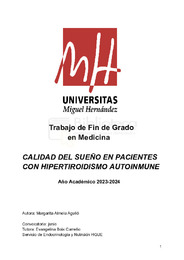Por favor, use este identificador para citar o enlazar este ítem:
https://hdl.handle.net/11000/33941Calidad del sueño en pacientes con hipertiroidismo autoinmune
| Título : Calidad del sueño en pacientes con hipertiroidismo autoinmune |
| Autor : Almela Agulló, Margarita |
| Tutor: Boix Carreño, Evangelina |
| Editor : Universidad Miguel Hernández |
| Departamento: Departamentos de la UMH::Medicina Clínica |
| Fecha de publicación: 2024-04-29 |
| URI : https://hdl.handle.net/11000/33941 |
| Resumen : Introducción. Entre las diferentes manifestaciones clínicas del hipertiroidismo autoinmune se ha descrito el insomnio como una de ellas. Esta alteración en el sueño, podría ser causa de deterioro de la calidad de vida de estos pacientes. Alcanzar el estado eutiroideo tras el tratamiento oportuno, podría relacionarse con mejoría de esta sintomatología. Hipótesis. Los pacientes con hipertiroidismo autoinmune tienen un deterioro en la calidad del sueño autopercibida. Objetivos. Analizar la calidad del sueño en pacientes con hipertiroidismo autoinmune activo. De forma secundaria, comparar la calidad de sueño en pacientes en fase de hipertiroidismo con aquellos que ya han conseguido el eutiroidismo y analizar si existe correlación entre la gravedad del hipertiroidismo y la calidad del sueño. Material y métodos. Estudio piloto transversal en el que se incluye un grupo de pacientes hipertiroideos y otro de pacientes eutiroideos tras haber recibido tratamiento, reclutados desde diciembre de 2023 a enero de 2024. Se recopilaron de Abucasis los datos antropométricos, bioquímicos, farmacológicos y clínicos. Se pasó el cuestionario de calidad de sueño Pittsburgh (PSQI) a ambos grupos. Se consideró como pobre calidad del sueño una puntuación a partir de 5 puntos. Análisis estadístico. El análisis Fisher para la comparación de dos variables cualitativas y el test de Chi cuadrado dependiendo de su idoneidad. Para la correlación ha sido empleado el test de Pearson, el test de Spearman y el de U de Mann-Whitney dependiendo de su idoneidad. Se ha considerado un p <0.05 para considerar diferencias estadísticamente significativas. Resultados. Se analizaron 32 pacientes, 15 hipertiroideos y 17 eutiroideos. La puntuación global de PSQI fue más elevada en el grupo hipertiroideo (mdna=10), lo que demuestra una mala calidad del sueño en este grupo. Se aprecia mejoría de la puntuación en el grupo eutiroideo (mdna=6) pero sin diferencias significativas (p=0.107). Existe correlación positiva entre los valores de T4 y los títulos de anticuerpos TRAK (073, p=0.00116). Los valores de T4 no se correlacionan con otras variables clínicas ni con la puntuación del PSQI. Conclusión. El hipertiroidismo autoinmune se asocia a un deterioro en la calidad del sueño. La normalización de las concentraciones de hormonas tiroideas se asocia a una mejoría de la calidad del sueño. No se ha evidenciado una correlación entre las concentraciones de T4 libre y la puntuación en el cuestionario Pittsburgh. Introduction. Among the different clinical manifestations of autoimmune hyperthyroidism, insomnia has been described as one of them. This alteration in sleep could be a cause of deterioration in the quality of life of these patients. Achieving a euthyroid state after timely treatment could be related to improvement in this symptomatology. Hypothesis. Patients with autoimmune hyperthyroidism have a deterioration in self-perceived sleep quality. Objectives. To analyze sleep quality in patients with active autoimmune hyperthyroidism. Secondarily, to compare the quality of sleep in patients in the hyperthyroidism phase with those who have already achieved euthyroidism and analyze if there is a correlation between the severity of hyperthyroidism and the quality of sleep. Material and methods. Cross-sectional pilot study that includes a group of hyperthyroid patients and another group of euthyroid patients after receiving treatment, recruited from December 2023 to January 2024. Anthropometric, biochemical, pharmacological and clinical data were collected from Abucasis. The Pittsburgh Sleep Quality Index (PSQI) was administered to both groups. A score of 5 points or more was considered poor sleep quality. Statistic analysis. The Fisher analysis for the comparison of two qualitative variables and the Chi square test depending on its suitability. For the correlation, the Pearson test, the Spearman test and the Mann-Whitney U test have been used depending on their suitability. A p <0.05 has been considered to consider statistically significant differences. Results. 32 patients were analyzed, 15 hyperthyroid and 17 euthyroid. The overall PSQI score was higher in the hyperthyroid group (mdn=10), demonstrating poor sleep quality in this group. There was an improvement in the score in the euthyroid group (mdn=6) but without significant differences (p=0.107). There is a positive correlation between T4 values and TRAK antibody titers (073, p=0.00116). T4 values do not correlate with other clinical variables or with the PSQI score. Conclusion. Autoimmune hyperthyroidism is associated with a deterioration in sleep quality. Normalization of thyroid hormone concentrations is associated with improved sleep quality. There has been no evidence of an evaluation between free T4 concentrations and the Pittsburgh questionnaire score. |
| Palabras clave/Materias: Hipertiroidismo Autoinmune Enfermedad de Graves-Basedow Oftalmopatía Bocio Calidad de sueño Índice de Pittsburgh |
| Área de conocimiento : CDU: Ciencias aplicadas: Medicina |
| Tipo de documento : info:eu-repo/semantics/bachelorThesis |
| Derechos de acceso: info:eu-repo/semantics/openAccess Attribution-NonCommercial-NoDerivatives 4.0 Internacional |
| Aparece en las colecciones: TFG- Medicina |
 La licencia se describe como: Atribución-NonComercial-NoDerivada 4.0 Internacional.
La licencia se describe como: Atribución-NonComercial-NoDerivada 4.0 Internacional.
.png)
